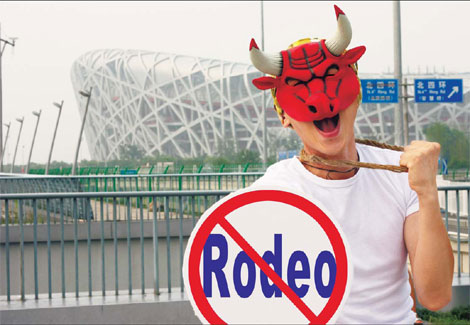Society
Say no to rodeo
Updated: 2011-08-31 07:51
By Wang Ru (China Daily)
|
An animal rights activist displays an anti-rodeo sign in front of the Bird's Nest in Beijing. Provided to China Daily |
A 'Western cowboy lifestyle show' to have been staged at the Bird's Nest in October has been postponed due to pressure from animal rights groups. Wang Ru reports.
Rodeo China, the first United States "Wild West" event in China, has been postponed until next year, after a coalition of 71 animal welfare organizations, including six international NGOs, worked for four months to prevent it taking place.
The campaign included two media conferences, a signature drive and an open letter to Gary Locke, the new US ambassador to China.
Qin Xiaona, head of Capital Animal Welfare Association, a NGO based in Beijing, confirmed the rodeo contest had been postponed, adding the information was from one of the Chinese organizers of the event - the China International Friendship Cities Association.
No ticket information from the National Stadium (Bird's Nest) was available and an employee told China Daily there was no scheduling information about the event.
Rodeo China is one of several cultural events that were planned in early April, part of the second annual China-US Consultation on People-to-People Exchange introduced by two US companies, ZZYX Entertainment and Less is Forever More Inc.
The so-called "Western cowboy lifestyle show" was to have been staged at the Bird's Nest, from Oct 3-10, attracting audiences during the National Day holidays.
The Chinese government approved the event, billed as "the Super Bowl of rodeo", in April. About 120 cowboys, 180 horses, 36 bulls and 90 steers were to have been involved.
It was being promoted as one of the biggest globally televised events at the Bird's Nest since the 2008 Olympics, to be broadcast to over 150 countries via television, Internet and other media.
In July, Guo Tiefu, a spokesman for the US organizers of Rodeo China, told China Daily the event would be staged as planned.
 |
Carrie Tucker, chief executive of Rodeo China, who has been doing business in China since the 1980s, and is co-founder of Less is Forever More Inc, had said the rodeo exemplified the culture of the American West and the founding history of the US. Tucker added rodeos were still a celebrated part of rural life in the US, but welfare groups here contended it was an outmoded and cruel sport.
"How would you feel if somebody suddenly jerked you neck with a rope while running at 35 km/h," says Liu Huili, a researcher at Green Beagle, a NGO based in Beijing. "Forcing animals to participate is not sport ... A sport has to be participated in voluntarily."
With regard to the claim that rodeos are educational, the Chinese campaigners say this is untrue. Liu says: "By coercing animals in rodeos and subjecting them to an unnatural setting and acting so as to 'entertain' an audience, rodeos are in fact saying people can do anything they like to the weak and disadvantaged."
"It is a misrepresentation of life in that part of the US," Qin Xiaona says. "Giving the Chinese people false information about the American people is not a respectful act by the American sponsors of rodeos."
"In the US, farmers who treat their cattle in such a cruel manner would be bankrupted and likely jailed," says Steve Hindi, president of SHARK (Showing Animals Respect and Kindness), a Chicago-based organization that campaigns against rodeos.
At the end of July, an open letter was sent by the animal welfare organizations to Gary Locke, the US ambassador to China, to cancel the event.
There was no official reply from the US embassy. Instead, an article was published in July on the blog tagged "US embassy to China" with the headline "How to correctly view rodeo". The author, named Xiao, stressed animal abuse is rare in modern rodeos in the US, which are controlled by stringent laws and regulations.
The article also cited statistics from Journal of the American Veterinary Medical Association, January 2001, stating that, in 26,584 rodeos, only 15 animals were injured - that is to say, for every 1,772 rodeo shows, only one animal got hurt.
However, Chinese animal groups received evidence from their US counterparts, which showed that during the "Cheyenne Frontier Days" rodeo in the US state of Wyoming, July 22-31, 2011, just three days into the event, a 4-year-old mare died and five calves and three bulls were injured.
"We do not need 1,772 rodeo events to wait for an animal to be injured. These are incomplete statistics. We do not want a new record to be created in China," Liu Huili says.
In 2001, Karen Chapman, a writer for Extra magazine, described how a rodeo horse died: "A 14-year-old horse named Prairie, part of a bare-back riding competition, had a broken bone and died. In front of 17,000 spectators, he was stretchered off.
"Although ESPN was showing the event live, there was a seven second delay before broadcast. The audience knew nothing of the incident as the cameras were cut off when the horse fell down and the commentator did not mention it. An hour later, the horse's body was disposed of."
Chinese animal rights groups are outraged that Rodeo China's American sponsors will use ESPN-style camera work and want Chinese organizers to show how much they love animals.
"They claim it is a good education opportunity for Chinese kids, however, we don't want our kids to know that joy can come out of violence and abuse," says Wei Xiangru, director of the Beijing Teenager Education Care Association.
The Ministry of Culture has banned shows that have violent content since 1997, and the State Forestry Administration has stopped shows that treat animals cruelly, since 2010.
China has no specific animal welfare laws, though there is rising public awareness of animal welfare.
In 2004, the Beijing Daxing district government canceled a Spanish bullfighting program after strong appeals against animal cruelty from deputies to the Beijing Municipal People's Congress and members of the Chinese People's Political Consultative Conference.
In April, a truck loaded with over 500 dogs, on the way to a slaughterhouse in Northeast China for hotpot restaurants, was stopped in Beijing by volunteers from local animal welfare organizations.
"There are many animal abuse cases in China already. What we need is a law to protect animals instead of importing more cruelty to animals," says Mang Ping, a professor with Central Institute of Socialist Studies in Beijing, who is an animal welfare activist and has called on the country's leaders to produce animal welfare laws.
"Rodeos have been banned in some states in the US and other countries like Britain and Germany. They are not welcomed by people who care for animals' feeling," Qin Xiaona says. "Chinese people prefer to see a (cultural) exchange that shows off the real essence of American culture, as a means of promoting friendship between the two countries, not cruel sports involving animals."
E-paper

City's dynamic teutons
German cluster gives a fillip, competitive edge to local economy in Taicang
Short and sweet
Game for growth
Character reference
Specials

Hunting grounds
Opinion divided as China debates opening door to international players

Flying the TCM flag
A small German town is home to Europe's flagship clinic for traditional Chinese medicine

Animal attraction
World's youngest chief fur designer set to launch own label and tap into huge China market.

